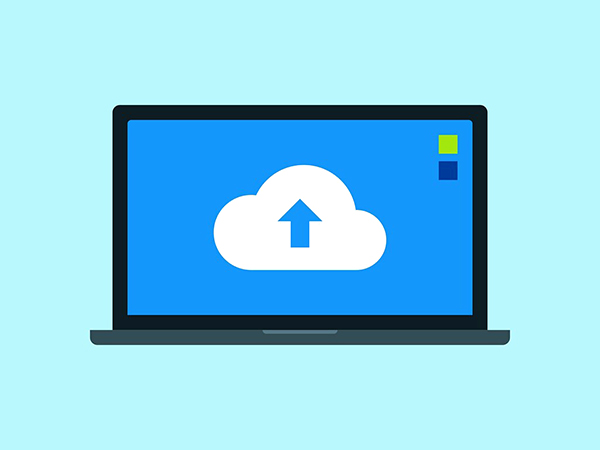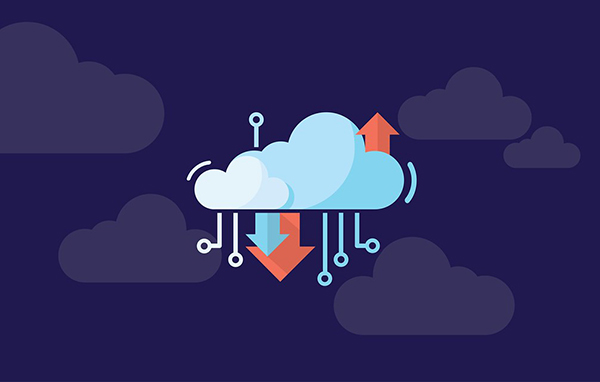Image from Pixabay
You're speaking with a colleague at work about a report you just finished, and they say, “I'll take a look. Can you upload it to the cloud?”
You panic.
Your brain starts bouncing around trying to figure out if your colleague was joking, if he's gone mad or if you really have to try and put your report on a cloud.
Are clouds even solid? How do I get up there?
You come back down to Earth, do a quick internet search of "what is cloud storage?" and you find us.
Welcome. We're glad you're here.

Image via flickr
Cloud? Like Weather?
As you've probably figured out by now, we are not talking about those big fluffy things up in the sky.
That's a good start.
So what is cloud storage? It's a service that allows you to store data on the internet.
The clouds are operated by providers that help manage and operate the service.
Remember those thumb drives everyone used to have on their keychains? Well, those got replaced by something much bigger, better and more convenient.
So did the need to purchase large and expensive external hard drives, or if you're dealing with a lot of data, building out a server.

Image via flickr
Make It Rain…Data: How Cloud Storage Works
Believe it or not, the internet's storage is a serious market. Companies or vendors purchase the space that they create the clouds from. In return, they own and operate it so your files can live in a safe and happy place.
What kinds of files, you may ask?
Just about every kind of file you can think of. Documents, photos, audio, video, design files-the sky is the limit with cloud storage. Once uploaded, you can share with anyone who is located anywhere because it all lives on the internet.
This type of technology has completely changed the file sharing game.
The Three Cloud Data-Tiers
There are three basic categories for what defines good cloud storage. It's really important that each of these categories is covered.

Image via pixabay
If one of them isn't, like security for example, then you shouldn't trust all your files there.
The three fundamental requirements for storing dating in a cloud are:
Durability
In the wake of everything except maybe a nuclear war, your data should be safe on the cloud. It doesn't matter what device you're using or where you're using it from; the cloud storage service should be able to deliver.
If you've ever had the hard drive on your computer crash, you know what a devastating blow it can be to lose it all. With cloud storage, that possibility is minimal to none.
These things are even built against human error. We all know we could use a little bit more of that in our lives.
Availability
There's a couple of different factors that go into this part.
First, your data should be reachable whenever, wherever. There are some restrictions with international usage (more on that later), but overall you should not run into problems. Second, depending on the operating systems and devices you use, it's important to evaluate which cloud storage option is best for you.
Third, your data should be available at a reasonable rate. This could mean cost and time. If you've ever tried to upload a large file that said it would take 34 days to complete, you know what we're talking about here.
Most cloud storage systems are built with increased bandwidth so you can upload and download anything at a reasonable speed.
Security
Obviously, when it comes to storing lots of personal or business information somewhere, security should be a cause for concern. Most popular cloud storage services offer extra layers of security, so you know your stuff is locked up good. This is one of the factors providers know matters most so they take every precaution in the book to make sure your data is safe and secure.
What's Your Type?
Depending on your personal or professional needs, there are different types of cloud storage architectures.

Image via pixabay
Without getting too technical, many different more in-depth parts of running a business can benefit from data storage solutions that cater more towards a specific type.
Many, however, are also able to do it all. We sure wish we could multitask as well as cloud storage can.
The different types of cloud storage architectures are:
Public
So, you live in an apartment building with 100 other people. You rent the apartment you live in from the person that owns the building, i.e., the landlord.
Essentially, public cloud storage providers are a landlord, and you are renting the cloud space from them. Does that make sense?
This is the most common consumer-based cloud storage option. The provider covers everything the architecture requires-hardware, software and infrastructure-and you just have to use it. It also means that you pay less by like, a lot. Score!
Examples of public clouds include Amazon Web Services, Google Cloud, Microsoft Azure, and IBM Cloud.
Private
Going off of the metaphor we used before, if public cloud storage is like renting an apartment then private is like owning a house.
It comes with everything owning a house comes with. You have to clean it, maintain it, fix it and you built it.
Many large organizations that accumulate a lot of data (we're talking A LOT of data), will build out their own cloud platforms to use with the organization. The most common companies that use private clouds are financial and healthcare institutions.
Part of it is because they are able to customize them to their organization's specific needs. The other is because each of those examples deals with important private information.
They need to make sure no one else would be able to access it.
It's also what government agencies use because of the insane amount of security you can build in. Although we hear about data breaches every so often, it usually takes a next level hacker to be able to crack those codes.
Hybrid
So if public is like an apartment building and private is like a house, what would a hybrid be? If you guessed a condominium, you guessed right!
If you couldn't tell by the name, a hybrid cloud storage architecture combines the advantages of private and public. How exactly does that work?
Well, essentially users are able to move between the public and private versions whenever they need to. You're not only stuck on one or the other.
Many businesses today are opting for this option because they use the public cloud for the majority of their work but still require the added benefit of the private version for storing data logs securely.
The Sky is the Limit: The Advantages of Cloud Storage

Image via pixabay
Have you ever lost your phone and all of the photos of your cat Steve along with it? How about gone through the not-so-pleasant process of uploading large files to an external hard drive? Cloud storage offers solutions to all of these problems and more.
Don't worry! Your precious cat photos are safe now. Here are some of the perks of parlaying into cloud storage.
Save that Money, Honey
Cost is a big incentive for people who switch to cloud storage. Google Drive, for instance, allows you to purchase 100 GB of space for a bargain of $1.99 per month.
A terabyte AKA a whole lot of storage for the newbies out there, is only $9.99.
But that's just Google. Some cloud storage services are cheaper or free. We recommend shopping around to see what you can find!
Hurricane Proof
The days of being worried about losing all of your important information to natural disasters or accidentally dropping your phone in the toilet are over. You can upload just about anything to the cloud. Personal photos, home videos, and important files included.
Plus, many people have their phones set up to automatically sync new content to the cloud every day. You don't even have to think about it! Rest easy; you're pretty much done with ever having to worry about data loss again.
All-Access Pass
Anyone from anywhere using just about anything that's able to open a browser can have access to the cloud.
Cloud storage has completed changed the business world for the better. If you work for a company that has offices spread out across the nation or the world, sharing a file or presentation is as easy as copy + paste link.
It has also been a game changer for the remote workers of the planet.
Safe and Sound
Vendors that offer cloud storage understand that people put a lot of important stuff on their clouds.
That's why many of them have built tons of security into making sure your family's vacation to the Wisconsin Dells stay safe.
We did say many though. Some cloud storage providers offer more security than others, so make sure you do your research before choosing one and starting to upload all of your personal information.
Effortlessly Ease-y
The interfaces for these things have been made to be foolproof. They're incredibly intuitive and simple, meaning someone with very basic computer skills can still benefit from using the cloud.
For those who may be a bit intimidated: these are not complicated services! Most users are able to pick it up in a very short amount of time.
Let the Good Times Roll
If you've ever been part of a data backing process at work, you know just how tedious of a task it can be. You can spend hours uploading your data only to have the upload fail and start again.
The automation aspect of cloud storage means you can simply just choose what you want to be backed up and when, and it will do it.
You know what that means? No more hours spent combing through files and then having your computer completely occupied as it uploads.
(DESIGNER_START)[Infographic likes this one: ]
The VIPs of Cloud Storage

Image via flickr
Now that we've covered how to use cloud storage and why, we can get to who you should be using it with.
The good news is, it's pretty easy to keep track of.
To date, there are only a couple of major providers that offer the security, durability, and convenience necessary for most users.
And they all come with their advantages and disadvantages. Depending on what features or storage amount you're looking for with your cloud, some may be better than others.
Circa: | Number of Users: | Total Storage Available: | Free storage: | Cost: | |
|---|---|---|---|---|---|
Google Drive | 2012 | 250+ million | 30TB | 15 GB | $1.99/month for 100GB, $9.99/month for 1TB |
One Drive | 2007 | 500+ million | 1TB | 5 GB | $2/month for 50GB |
Dropbox | 2008 | 500+ million | UNLIMITED | 2 GB | $10/month for 1TB |
Box | 2005 | 44+ million | Unlimited | 10 GB | 100 GB |
Amazon Cloud Drive | 2011 | 2 million | Available: | None | $12/year for unlimited photos, $60/year for unlimited files |
Backing Up Personal Data: Hackers Beware, You're In For A Scare

Image via flickr
You've heard the horror stories about hacking gone totally wrong. Personal photos, financial information, and private content leaked for the entire world to see. It ain't pretty.
Unfortunately, it's a risk you take when using a cloud storage option. But the chances of something like that happening to you are small. Like nanobyte small. Even if your password is more complicated than one of Tesla's mathematical formulas, it's always a good idea to take extra precautions against any type of cybercrime.
Don't Put Sensitive Information on the Cloud

Image via flickr
This is obviously the easiest way to stay protected while using a cloud data storage provider. If you don't have anything that could be used for identity theft or worse, then you don't have to worry about it. What's considered sensitive? Files or documents that contain any information that could be used against you or to steal information. Examples include: bank statements, medical files, tax information, credit card statements, etc.
If you don't put any of this on the cloud, you don't have to worry about someone unsavory finding it.
Read the User Agreement
We know. Not fun times. But when you're storing important personal or business materials somewhere, it's important to know exactly what you're in for.
There should be statements that your property can't be used by another party to gather information.
And hey, reading all that boring stuff has its perks. It can also help you learn exactly what your cloud storage service does.
File Encryption
This is the safest bet for protecting your data. If you have certain files you want to store on your cloud that could be considered confidential, an encryption service will let you create a password for that file.
That way, even if someone is able to get access to it, they would never be able to open it.
You can download encryption software like B1 Free Archiver (https://b1.org/) and happily upload all you want onto your cloud with any repercussions.
Create An Impossible Password
It's a sordid chore to have to constantly be creating and changing passwords to pass certain security tests. But the truth us, this extra step is in your best interest.
The fact of the matter is, an easy password just means it's easier to crack. Did you know that 63% of all data breaches are a direct result of a weak or stolen password (https://info.idagent.com/blog/2017/06/16/63-data-breaches-result-weak-stolen-passwords)?
There are a couple of key points to keep in mind when creating a strong password. First, don't have your password be password. Second, use a lot of different symbols, uppercase, and lowercase letters and numbers.
It's kind of like those secret codes you used to have for passing notes in class. If your password is hard to remember, you're on the right track.
Finally, don't share or store your password anywhere that's easily accessible. Email, phones, and computers aren't totally safe. In the worst case scenario, your email is hacked, or computer is stolen, the thieves could gain access to everything important in your life.
Paid vs. Free: Which Option is Best?

Image via flickr
As we showed in the above graph, no cloud storage option is going to break your bank. There are minimally expensive and paying for extra storage can come with a lot of advantages.
But if you don't need an unlimited amount of storage space, you might as well save the money and stick with a free version.
In general, paying for more storage has two advantages: more data upload capabilities and better bandwidth aka upload and download speeds.
Gone Fishing: What Are Big Data Lakes?

Image via flickr
Cloud storage, data lakes, data warehouses. What's the difference and what do they all do?
If you're using big data depositories for business, there are multiples options that you can choose from.
The good news is that they're not at all alike and are used for vastly different reasons.
Data Lakes
We'll start with data lakes. A data lake is used by businesses to store information that will be used down the road to improve their business.
The data stored is raw, as in the data has not yet been processed and the purpose has yet to be determined. These are not files. It is just random information.
The people who utilize the stuff in data lakes? Data scientists, of course. We know. Bet you never even knew one of those existed!
Some major industries that use data lakes are healthcare, education, and transportation.
Data Warehouses
A data warehouse is another method for storing large amounts of data for businesses. This data, however, is already processed and ready for business professionals to use.
Processed data is the type of information that's used in spreadsheets, charts, and tables. It can help improve profitability and practices.
The biggest industry that uses data warehouses is finance. That's because the data within it can be accessed by entire companies rather than just data scientists.
The Great Debate: Android Vs. Apple
Whether you're an Android user or Apple fanatic, the cloud storage provider you choose can vary. Features, compatibility and mobile apps play a big role in which one a person chooses to go with. Much of what we do and create today is phone-focused, and the data cloud should sync with all of your devices.
Here's a breakdown of what operating systems the top cloud storage services support:
Business or Pleasure? Choosing the Best Storage Options For Your Company
If you're a multimedia agency that needs to store a lot of design files, video, photos, and other large data, you'd be better off going with one of the services that offer unlimited space.
If you're a small business that's looking for a more convenient way of storing and sharing some basic files, you could opt for a smaller amount.
It's beneficial for all business to have access to extra features like Google Docs or Google Sheets because it cuts down on a lot of back and forth. Anyone who has access to the files can either view or edit. It's pretty neat, really!
Is Cloud Hosting a Web Hosting Service?
That, our friend, is a great question. In short, yes. Cloud hosting, or the provider that hosts your cloud storage, is a type of web hosting.
However, there are many different types of web hosting.
If you work for a mid to large-sized company, we bet they are currently using one of the top three. The main reason businesses use a web-hosting service is to host their WEB-site.
Does that make sense now?
Essentially, a website is just a bunch of files and code that are stored somewhere safe so you can access them. But a single computer is too small to handle the capacity of a website, so all of that information is stored on a server.
And like cloud storage, you are essentially renting space from a web hosting provider to allow your website to exist. Plus, they come with some perks like server management, support, backups, malware, etc.
Even if your company uses cloud storage as an added benefit, most of them will still back up important data with at least one other web hosting service.
International Affairs: Using Cloud Storage Abroad
You're on the first vacation you've taken in five years, and a huge problem comes up with work. You don't have your computer, and you need to fix it.
What do you do?
In the good ol' days of work, there really was nothing you could do.
With the help of the cloud, that's not the case today.
Many data storage options are able to be accessed around the world. For companies that have offices and bases everywhere, this is a priceless luxury that has made working that much easier.
But it's not only businesses that can benefit from this factor: your personal files can be accessed too.
It doesn't matter if you're on the other side of the world. As long as you have an internet connection, you'll also probably have access to your cloud.
One thing to note is different international policies regarding how cloud storage is monitored. But that is more an issue in political policy than it is individual access. Essentially, countries have different legislature and laws in place in regards to how clouds are managed by the affiliating government.
What's the Forecast for the Clouds?
The future of cloud computing is a hot topic right now. As with all things tech industry, the speed at which we see new products and solutions emerging has gone from once every decade to once per year.
Michael Corrado, the Worldwide Marketing Manager for Hewlett Packard, said this what he sees in store:
“The future of cloud computing will most likely represent a combination of cloud-based software products and on-premises compute to create a hybrid IT solution that balances the scalability and flexibility associated with cloud and the security and control of a private data center.”
Essentially, different providers will continue to work on a cloud storage option that allows for bigger, better and cheaper options, so everyone is happy.
Remember when we talked about the different types of cloud storage before? That hybrid option is what more services will try to move toward.
We'll also see more large brands create cloud options, expanding the market beyond the handful that currently holds the throne.
Another technology expert, Peter Sbarski of Cloud Guru, said he thinks serverless technologies will quickly begin to become the norm and eventually fade out any competition.
“Most organizations won't need to pay for or manage fleets of expensive servers to run their code, power websites and apps, and process data. Instead, they'll use hosted compute services run by public cloud providers like Amazon, Microsoft, and Google,” Sbarski said.
Whatever the future holds, there are some exciting data storage solutions coming our way.
We Now Pronounce You…Cloud Experts
Are you feeling better? We sure hope so.
With technological advancements continuing to shape the way we live our lives, it can seem hard to keep up.
The good news is, there's a number of ways you can get a better hold of cloud storage and how it works.
Look for online classes, ask a colleague or friend or watch videos centered on the platform that your business uses.
Remember, most of the cloud storage services are free! There's no better way to learn than creating an account and digging into that data.
Before you know it, you'll be the one teaching others how to use the cloud.

